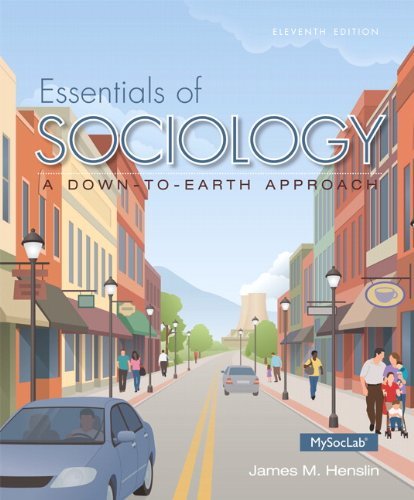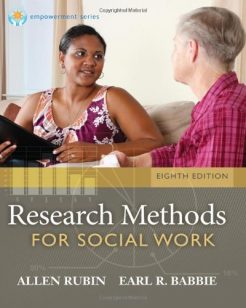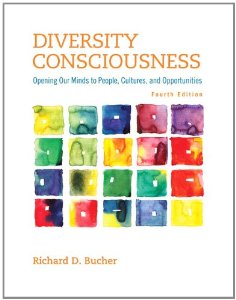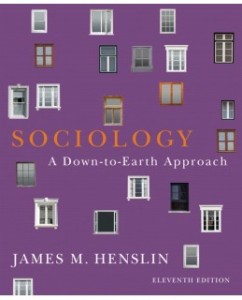Description
Essentials of Sociology Henslin 11th Edition Test Bank
Essentials of Sociology Henslin 11th Edition Test Bank
***THIS IS NOT THE ACTUAL BOOK. YOU ARE BUYING the Test Bank in e-version of the following book***
Name: Essentials of Sociology
Author: Henslin
Edition: 11th
ISBN-10: 0133803546
Type: Test Bank
– The test bank is what most professors use an a reference when making exams for their students, which means there’s a very high chance that you will see a very similar, if not exact the exact, question in the test!
– The file is either in .doc, .padf, excel, or zipped in the package and can easily be read on PCs and Macs.
– Delivery is INSTANT. You can download the files IMMEDIATELY once payment is done.
If you have any questions, please feel free to contact us. Our response is the fastest. All questions will always be answered in 6 hours., most of the time within 30mins
We also faced similar difficulities when we were students, and we understand how you feel.
But now, with the Essentials of Sociology Test Bank, you will be able to
* Anticipate the type of the questions that will appear in your exam.
* Reduces the hassle and stress of your student life.
* Improve your studying and also get a better grade!
* Get prepared for examination questions.
*Can save you time and help you understand the material.
This is the quality of service we are providing and we hope to be your helper.
Delivery is in the next moment. Test Bank is accurate.
Prepare to receive your Essentials of Sociology Test Bank in the next moment.
If you have any questions, or would like a receive a sample chapter before your purchase, please contact us at inquiry@testbankcorp.com
Essentials of Sociology Test Bank
Essentials of Sociology Henslin 11th Edition Test Bank ISBN: 0133803546
Chapter 1 The Sociological Perspective
1.1 True/False Questions
1) The corners of life that people occupy such as jobs, income, education, gender, age, and race are referred to as the social imperative.
Answer: FALSE
Diff: 1 Page Ref: 2
Skill Level: Know the Facts
LO: 1.1 Explain why both history and biography are essential for the sociological perspective.
Topic/A-head: The Sociological Perspective
2) Applying the scientific method to the social world is called empiricism.
Answer: FALSE
Diff: 2 Page Ref: 4
Skill Level: Know the Facts
LO: 1.2 Trace the origins of sociology, from tradition to Max Weber.
Topic/A-head: Origins of Sociology
3) Herbert Spencer believed the most capable and intelligent members of a society would survive while the weak and “less fit” would die, thus improving society, in a master plan that he called “survival of the fittest.”
Answer: TRUE
Diff: 2 Page Ref: 5
Skill Level: Understand the Concepts
LO: 1.2 Trace the origins of sociology, from tradition to Max Weber.
Topic/A-head: Origins of Sociology
4) Karl Marx thought of himself as a classical sociologist, a label that greatly influenced his theories on class conflict.
Answer: FALSE
Diff: 1 Page Ref: 5
Skill Level: Know the Facts
LO: 1.2 Trace the origins of sociology, from tradition to Max Weber.
Topic/A-head: Origins of Sociology
5) Emile Durkheim identified the degree of social integration as the primary variable to explain different rates of suicide within different European nations.
Answer: TRUE
Diff: 1 Page Ref: 6
Skill Level: Know the Facts
LO: 1.2 Trace the origins of sociology, from tradition to Max Weber.
Topic/A-head: Origins of Sociology
6) According to Max Weber, the “sign” Calvinists looked for as an indication they were saved was their successful investment in capital.
Answer: TRUE
Diff: 1 Page Ref: 7
Skill Level: Know the Facts
LO: 1.2 Trace the origins of sociology, from tradition to Max Weber.
Topic/A-head: Origins of Sociology
7) Frances Perkins, a sociologist, won the Nobel Prize for her work with the homeless in Hull-House.
Answer: FALSE
Diff: 1 Page Ref: 8, 11
Skill Level: Know the Facts
LO: 1.3 Trace the development of sociology in North America and explain the tension between objective analysis and social reform.
Topic/A-head: Sociology in North America
8) Despite her acclaimed research on social life, until recently Harriet Martineau was best known for translating Comte’s works on sociology into English.
Answer: TRUE
Diff: 1 Page Ref: 8
Skill Level: Know the Facts
LO: 1.3 Trace the development of sociology in North America and explain the tension between objective analysis and social reform.
Topic/A-head: Sociology in North America
9) Booker T. Washington was the first African American to earn a doctorate degree from Harvard University.
Answer: FALSE
Diff: 1 Page Ref: 8
Skill Level: Know the Facts
LO: 1.3 Trace the development of sociology in North America and explain the tension between objective analysis and social reform.
Topic/A-head: Sociology in North America
10) C. Wright Mills urged American sociologists to concentrate on social reform, developing the concept of the power elite to illustrate how top leaders of business, politics, and the military were an imminent threat to American freedom.
Answer: TRUE
Diff: 2 Page Ref: 11
Skill Level: Understand the Concepts
LO: 1.3 Trace the development of sociology in North America and explain the tension between objective analysis and social reform.
Topic/A-head: Sociology in North America
11) According to the principles of symbolic interactionism, symbols not only allow relationships to exist, they also allow society to exist.
Answer: TRUE
Diff: 2 Page Ref: 13-14
Skill Level: Understand the Concepts
LO: 1.4 Explain the basic ideas of symbolic interactionism, functional analysis, and conflict theory.
Topic/A-head: Theoretical Perspectives in Sociology
12) Sociologists who use the functionalist perspective stress how industrialization and urbanization have undermined the traditional functions of the family.
Answer: TRUE
Diff: 2 Page Ref: 16
Skill Level: Understand the Concepts
LO: 1.4 Explain the basic ideas of symbolic interactionism, functional analysis, and conflict theory.
Topic/A-head: Theoretical Perspectives in Sociology
13) Sociologist Lewis Coser pointed out that conflict is most likely to develop among people who are in close relationships.
Answer: TRUE
Diff: 2 Page Ref: 18
Skill Level: Know the Facts
LO: 1.4 Explain the basic ideas of symbolic interactionism, functional analysis, and conflict theory.
Topic/A-head: Theoretical Perspectives in Sociology
14) Commonsense ideas are the best topics to choose for sociological research, because they represent “what everyone knows.”
Answer: FALSE
Diff: 1 Page Ref: 20
Skill Level: Know the Facts LO: 1.5 Explain why common sense can’t replace sociological research. Topic/A-head: Doing Sociological Research
15) The first step in the research model is to formulate a hypothesis.
Answer: FALSE
Diff: 1 Page Ref: 20
Skill Level: Know the Facts LO: 1.5 Explain why common sense can’t replace sociological research. Topic/A-head: Doing Sociological Research
16) When an instrument measures what it is intended to measure, it is considered to possess the quality of reliability.
Answer: FALSE
Diff: 1 Page Ref: 21
Skill Level: Know the Facts LO: 1.5 Explain why common sense can’t replace sociological research. Topic/A-head: Doing Sociological Research
17) The individuals that are intended to represent the population to be studied are referred to as the sample.
Answer: TRUE
Diff: 1 Page Ref: 24
Skill Level: Know the Facts LO: 1.6 Know the main elements of the 7 research methods: surveys, participant observation, case studies, secondary analysis, analysis of documents, experiments, and unobtrusive measures. Topic/A-head: Research Methods (Designs)
18) The mean is commonly the most representative measure of the average when comparing scores in a distribution.
Answer: FALSE
Diff: 2 Page Ref: 24
Skill Level: Understand the Concepts LO: 1.6 Know the main elements of the 7 research methods: surveys, participant observation, case studies, secondary analysis, analysis of documents, experiments, and unobtrusive measures. Topic/A-head: Research Methods (Designs)
19) A multiple-choice exam is an example of a test structure composed of closed-ended questions.
Answer: TRUE
Diff: 1 Page Ref: 25
Skill Level: Know the Facts LO: 1.6 Know the main elements of the 7 research methods: surveys, participant observation, case studies, secondary analysis, analysis of documents, experiments, and unobtrusive measures. Topic/A-head: Research Methods (Designs)
20) “Research bias” and “research fraud” are concepts that can be used interchangeably because they are virtually identical.
Answer: FALSE
Diff: 2 Page Ref: 26
Skill Level: Understand the Concepts LO: 1.6 Know the main elements of the 7 research methods: surveys, participant observation, case studies, secondary analysis, analysis of documents, experiments, and unobtrusive measures. Topic/A-head: Research Methods (Designs)
21) In order to establish rapport with a sample while researching sensitive and personal issues, the researcher should begin by asking emotional and personal questions so he or she can relate to the respondents.
Answer: FALSE
Diff: 3 Page Ref: 27
Skill Level: Apply What You Know LO: 1.6 Know the main elements of the 7 research methods: surveys, participant observation, case studies, secondary analysis, analysis of documents, experiments, and unobtrusive measures. Topic/A-head: Research Methods (Designs)
22) One of the liabilities in using the participant observation as a research method is that findings are difficult to generalize.
Answer: TRUE
Diff: 1 Page Ref: 27
Skill Level: Know the Facts LO: 1.6 Know the main elements of the 7 research methods: surveys, participant observation, case studies, secondary analysis, analysis of documents, experiments, and unobtrusive measures. Topic/A-head: Research Methods (Designs)
23) Researchers are violating people’s privacy when gathering information from Facebook because the Internet is technically a private domain.
Answer: FALSE
Diff: 2 Page Ref: 30
Skill Level: Apply What You Know LO: 1.6 Know the main elements of the 7 research methods: surveys, participant observation, case studies, secondary analysis, analysis of documents, experiments, and unobtrusive measures. Topic/A-head: Research Methods (Designs)
24) For an independent variable to be the cause of an event, it must precede that which is changed (the dependent variable).
Answer: TRUE
Diff: 1 Page Ref: 29-30
Skill Level: Know the Facts LO: 1.6 Know the main elements of the 7 research methods: surveys, participant observation, case studies, secondary analysis, analysis of documents, experiments, and unobtrusive measures. Topic/A-head: Research Methods (Designs)
25) Interviewer bias may occur because of a researcher’s sex, race, or perceived ethnicity.
Answer: TRUE
Diff: 3 Page Ref: 30
Skill Level: Apply What You Know LO: 1.7 Explain how gender is significant in sociological research.
Topic/A-head: Gender in Sociological Research
26) When utilizing correlations to assess variables related to human behavior, the researcher will seldom find either a perfect positive correlation or a perfect negative correlation.
Answer: TRUE
Diff: 2 Page Ref: 31
Skill Level: Understand the Concepts LO: 1.6 Know the main elements of the 7 research methods: surveys, participant observation, case studies, secondary analysis, analysis of documents, experiments, and unobtrusive measures. Topic/A-head: Research Methods (Designs)
27) If two variables have a perfect correlation, they will be represented by a correlation coefficient of zero.
Answer: FALSE
Diff: 1 Page Ref: 31
Skill Level: Know the Facts LO: 1.6 Know the main elements of the 7 research methods: surveys, participant observation, case studies, secondary analysis, analysis of documents, experiments, and unobtrusive measures. Topic/A-head: Research Methods (Designs)
28) A correlation simply means that two or more variables are present together.
Answer: TRUE
Diff: 1 Page Ref: 31
Skill Level: Know the Facts LO: 1.6 Know the main elements of the 7 research methods: surveys, participant observation, case studies, secondary analysis, analysis of documents, experiments, and unobtrusive measures. Topic/A-head: Research Methods (Designs)
29) Sociologists have always agreed that the most important goal of sociology is to generate social change.
Answer: FALSE
Diff: 1 Page Ref: 34
Skill Level: Know the Facts
LO: 1.9 Explain how research versus reform and globalization are likely to influence sociology.
Topic/A-head: Trends Shaping the Future of Sociology
1.2 Multiple Choice Questions
1) When sociologists’ group people into categories based on their age, gender, educational level, job, and income, they are trying to determine ________.
A) social network
B) social location
C) social personality
D) social skills
Answer: B
Diff: 3 Page Ref: 2
Skill Level: Apply What You Know
LO: 1.1 Explain why both history and biography are essential for the sociological perspective.
Topic/A-head: The Sociological Perspective
2) The sociological perspective emphasizes how the social context influences people’s lives, particularly how people are influenced by ________.
A) random chance events
B) geographical location
C) inherited genetic structure
D) society
Answer: D
Diff: 1 Page Ref: 2
Skill Level: Know the Facts
LO: 1.1 Explain why both history and biography are essential for the sociological perspective.
Topic/A-head: The Sociological Perspective
3) The sociologist responsible for suggesting the connection between history and biography to explain the sociological imagination was ________.
A) Talcott Parsons
B) Herbert Spencer
C) C. Wright Mills
D) Emile Durkheim
Answer: C
Diff: 3 Page Ref: 2
Skill Level: Know the Facts
LO: 1.1 Explain why both history and biography are essential for the sociological perspective.
Topic/A-head: The Sociological Perspective
4) Which of the following elements did C. Wright Mills attribute as being the one that sociologists would use to explain individual behavior?
A) common sense
B) instinct
C) external influence
D) inherited ability
Answer: C
Diff: 1 Page Ref: 3
Skill Level: Know the Facts
LO: 1.1 Explain why both history and biography are essential for the sociological perspective.
Topic/A-head: The Sociological Perspective
5) The first person to propose that the scientific method could be applied to the study of social life was ________.
A) Emile Durkheim
B) Max Weber
C) Karl Marx
D) Auguste Comte
Answer: D
Diff: 1 Page Ref: 4
Skill Level: Know the Facts
LO: 1.2 Trace the origins of sociology, from tradition to Max Weber.
Topic/A-head: Origins of Sociology
6) What is the use of objective and systematic observation to test theories, one that is often employed by sociologists?
A) the commutation process
B) common sense
C) the scientific method
D) research analysis
Answer: C
Diff: 1 Page Ref: 4
Skill Level: Know the Facts
LO: 1.2 Trace the origins of sociology, from tradition to Max Weber.
Topic/A-head: Origins of Sociology
7) What was the social event that most influenced Auguste Comte to explore patterns within society and become interested in what holds society together?
A) the discovery of the New World
B) the Spanish Inquisition
C) the Russian Revolution
D) the French Revolution
Answer: D
Diff: 2 Page Ref: 4
Skill Level: Know the Facts
LO: 1.2 Trace the origins of sociology, from tradition to Max Weber.
Topic/A-head: Origins of Sociology
8) The notion that only the fittest members of society deserve to survive and that social programs to help the poor will ultimately weaken the social order is a doctrine known as ________.
A) social Darwinism
B) positivism
C) post-modernism
D) social welfare
Answer: A
Diff: 1 Page Ref: 5
Skill Level: Know the Facts
LO: 1.2 Trace the origins of sociology, from tradition to Max Weber.
Topic/A-head: Origins of Sociology
9) The term “survival of the fittest,” which is a principle part of the concept of social Darwinism, was coined by ________.
A) Charles Darwin
B) Talcott Parsons
C) Auguste Comte
D) Herbert Spencer
Answer: D
Diff: 3 Page Ref: 5
Skill Level: Know the Facts
LO: 1.2 Trace the origins of sociology, from tradition to Max Weber.
Topic/A-head: Origins of Sociology
10) The theorist who is sometimes referred to as “the second founder of sociology” was ________.
A) Henri Saint Simon
B) Herbert Spencer
C) Emile Durkheim
D) Karl Marx
Answer: B
Diff: 1 Page Ref: 5
Skill Level: Know the Facts
LO: 1.2 Trace the origins of sociology, from tradition to Max Weber.
Topic/A-head: Origins of Sociology
11) Karl Marx suggested that the force that drives human history and is at the core of human society is ________.
A) class conflict
B) religion
C) family
D) education
Answer: A
Diff: 1 Page Ref: 5
Skill Level: Know the Facts
LO: 1.2 Trace the origins of sociology, from tradition to Max Weber.
Topic/A-head: Origins of Sociology
12) The Wall Street Journal has declared that the three greatest modern thinkers were ________, ________, and ________.
A) Karl Marx; Sigmund Freud; Albert Einstein
B) Max Weber; B. F. Skinner; J. Edgar Hoover
C) Karl Marx; Louis Pasteur; Albert Einstein
D) Frank Lloyd Wright; Jonas Salk; Sigmund Freud
Answer: A
Diff: 1 Page Ref: 5
Skill Level: Know the Facts
LO: 1.2 Trace the origins of sociology, from tradition to Max Weber.
Topic/A-head: Origins of Sociology
13) The social thinker of the 19th century who predicted that there would be a classless society once the working class united and began a revolution was ________.
A) Emile Durkheim
B) C. Wright Mills
C) Herbert Spencer
D) Karl Marx
Answer: D
Diff: 1 Page Ref: 5
Skill Level: Know the Facts
LO: 1.2 Trace the origins of sociology, from tradition to Max Weber.
Topic/A-head: Origins of Sociology
14) The titles Karl Marx used to describe the two classes in society were the ________ and the ________.
A) nobles; peasants
B) bourgeoisie; proletariat
C) upper class; lower class
D) civilized; barbarians
Answer: B
Diff: 2 Page Ref: 5
Skill Level: Know the Facts
LO: 1.2 Trace the origins of sociology, from tradition to Max Weber.
Topic/A-head: Origins of Sociology
15) The French sociologist Emile Durkheim is most identified with which of the following areas of study?
A) social integration
B) class conflict
C) social Darwinism
D) the spirit of capitalism
Answer: A
Diff: 1 Page Ref: 6
Skill Level: Know the Facts
LO: 1.2 Trace the origins of sociology, from tradition to Max Weber.
Topic/A-head: Origins of Sociology
16) Max Weber referred to the self-denying approach to life characterized by people living frugal lives and saving their money as the ________.
A) spirit of capitalism
B) socialist conscience
C) Protestant ethic
D) manifest function
Answer: C
Diff: 1 Page Ref: 8
Skill Level: Know the Facts
LO: 1.2 Trace the origins of sociology, from tradition to Max Weber.
Topic/A-head: Origins of Sociology
17) Karl Marx believed that ________ was the central force for social change, while Max Weber believed that ________ was the force most responsible for social change.
A) economics; religion
B) education; political stability
C) government; economics
D) religion; education
Answer: A
Diff: 3 Page Ref: 7
Skill Level: Apply What You Know
LO: 1.2 Trace the origins of sociology, from tradition to Max Weber.
Topic/A-head: Origins of Sociology
18) According to Max Weber, the Protestant ethic was a central factor in the birth of ________.
A) capitalism
B) democracy
C) socialism
D) bureaucracy
Answer: A
Diff: 2 Page Ref: 7
Skill Level: Understand the Concepts
LO: 1.2 Trace the origins of sociology, from tradition to Max Weber.
Topic/A-head: Origins of Sociology
19) What distinction did sociologist Frances Perkins hold in American history?
A) She was the first woman president of the American Sociological Association.
B) She won a Nobel Prize for her work with poor women.
C) She was the first woman elected governor.
D) She was the first woman to hold a presidential cabinet position.
Answer: D
Diff: 3 Page Ref: 8
Skill Level: Know the Facts
LO: 1.3 Trace the development of sociology in North America and explain the tension between objective analysis and social reform.
Topic/A-head: Sociology in North America
20) Because of her outstanding contributions to social reform, as demonstrated in her work as co-founder of Hull-House, ________ was a co-winner of the Nobel Peace Prize in 1931.
A) Marion Talbot
B) Charlotte Perkins Gilman
C) Alice Paul
D) Jane Addams
Answer: D
Diff: 1 Page Ref: 11
Skill Level: Know the Facts
LO: 1.3 Trace the development of sociology in North America and explain the tension between objective analysis and social reform.
Topic/A-head: Sociology in North America
21) The first African American to earn a doctorate from Harvard University, who spent his lifetime studying race relations in America and was one of the founders of the NAACP, was ________.
A) W. E. B. Du Bois
B) Booker T. Washington
C) George Washington Carver
D) Benjamin Quarles
Answer: A
Diff: 1 Page Ref: 8-11
Skill Level: Know the Facts
LO: 1.3 Trace the development of sociology in North America and explain the tension between objective analysis and social reform.
Topic/A-head: Sociology in North America
22) The American sociologist who focused on social analysis, developing abstract models showing how parts of society harmoniously work together, was ________.
A) Talcott Parsons
B) Ernest Burgess
C) Robert E. Park
D) W. I. Thomas
Answer: A
Diff: 1 Page Ref: 11
Skill Level: Know the Facts
LO: 1.3 Trace the development of sociology in North America and explain the tension between objective analysis and social reform.
Topic/A-head: Sociology in North America
23) Dr. Zahn’s academic interest is analyzing various aspects of society and publishing his findings in sociological journals. In view of this, Dr. Zahn is considered to be a(n) ________ sociologist.
A) applied
B) practical
C) basic (or pure)
D) reform
Answer: C
Diff: 3 Page Ref: 11-12
Skill Level: Apply What You Know
LO: 1.3 Trace the development of sociology in North America and explain the tension between objective analysis and social reform.
Topic/A-head: Sociology in North America
24) The sociologist who developed the concept of the power elite was ________.
A) C. Wright Mills
B) Talcott Parsons
C) Robert K. Merton
D) F. Ivan Nye
Answer: A
Diff: 1 Page Ref: 11
Skill Level: Know the Facts
LO: 1.3 Trace the development of sociology in North America and explain the tension between objective analysis and social reform.
Topic/A-head: Sociology in North America
25) During his career, Anthony has worked as a juvenile police officer, corrections counselor in a state prison, and executive director of an urban redevelopment program. In view of this, which description best describes Anthony’s career path?
A) Anthony has been a pure sociologist.
B) Anthony has assumed the role of being a basic sociologist.
C) Anthony has been an applied sociologist.
D) Anthony has been a social reformer.
Answer: C
Diff: 1 Page Ref: 12
Skill Level: Apply What You Know
LO: 1.3 Trace the development of sociology in North America and explain the tension between objective analysis and social reform.
Topic/A-head: Sociology in North America
26) Sociologists who analyze how social life depends on the ways that people define themselves and others are most likely ________.
A) ethnomethodologists
B) functionalists
C) conflict theorists
D) symbolic interactionists
Answer: D
Diff: 2 Page Ref: 13-14
Skill Level: Understand the Concepts
LO: 1.4 Explain the basic ideas of symbolic interactionism, functional analysis, and conflict theory.
Topic/A-head: Theoretical Perspectives in Sociology
27) Functionalists refer to how parts of a society fit together to form a whole as ________.
A) a symbol
B) a synthesis
C) an integration
D) a structure
Answer: D
Diff: 1 Page Ref: 15
Skill Level: Know the Facts
LO: 1.4 Explain the basic ideas of symbolic interactionism, functional analysis, and conflict theory.
Topic/A-head: Theoretical Perspectives in Sociology
28) The two sociologists who referred to society as being a kind of living organism were _______ and ________.
A) Auguste Comte; Emile Durkheim
B) Karl Marx; Max Weber
C) Auguste Comte; Herbert Spencer
D) Emile Durkheim; Max Weber
Answer: C
Diff: 3 Page Ref: 15
Skill Level: Know the Facts
LO: 1.4 Explain the basic ideas of symbolic interactionism, functional analysis, and conflict theory.
Topic/A-head: Theoretical Perspectives in Sociology
29) Mark views society as a system of interrelated parts, while John views society as composed of groups competing for scarce resources. Mark would be considered a(n) ________ and John would be seen as a(n) ________.
A) symbolic interactionist; functionalist
B) applied sociologist; functionalist
C) basic sociologist; applied sociologist
D) functionalist; conflict theorist
Answer: D
Diff: 3 Page Ref: 15-18
Skill Level: Apply What You Know
LO: 1.4 Explain the basic ideas of symbolic interactionism, functional analysis, and conflict theory.
Topic/A-head: Theoretical Perspectives in Sociology
30) According to Robert Merton, ________ are the intended beneficial consequences of people’s actions.
A) latent functions
B) manifest dysfunctions
C) manifest functions
D) latent dysfunctions
Answer: C
Diff: 1 Page Ref: 16
Skill Level: Know the Facts
LO: 1.4 Explain the basic ideas of symbolic interactionism, functional analysis, and conflict theory.
Topic/A-head: Theoretical Perspectives in Sociology
31) College provides a haven for several million potential workers who are classified as “students” rather than “unemployed,” which helps stabilize the job market. This situation represents what Merton would describe as a ________.
A) manifest function
B) latent dysfunction
C) manifest dysfunction
D) latent function
Answer: D
Diff: 3 Page Ref: 16
Skill Level: Apply What You Know
LO: 1.4 Explain the basic ideas of symbolic interactionism, functional analysis, and conflict theory.
Topic/A-head: Theoretical Perspectives in Sociology







Reviews
There are no reviews yet.